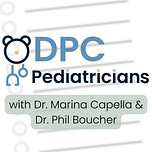In this episode, Dr. Phil Boucher and Dr. Marina Capella explore the nuanced question: Can Direct Primary Care (DPC) serve low-income families effectively? This discussion delves into their personal experiences and innovative strategies for incorporating diverse economic backgrounds into their practices. The episode provides a heartfelt examination of the challenges and solutions involved in making DPC accessible to all, regardless of financial standing.
Key Highlights
Dr. Marina discusses her commitment to serving underserved communities and her strategic approaches to integrate low-income families into her practice.
Dr. Phil shares insights on the common misconceptions about DPC being only for the wealthy and discusses the demographic reality of his patient panel which includes a diverse economic range.
Introduction of sliding scale fees as a practical solution to offer quality care to those who might not otherwise afford it, including a discussion on how these are managed within their practices to maintain sustainability.
The importance of community engagement and flexibility in service offerings to accommodate the financial and healthcare needs of various families, especially those who are low-income or uninsured.
Real-life examples of community support initiatives like formula banks and partnerships with local agencies to provide necessary care and support during community crises like the COVID-19 pandemic and formula shortages.
More questions or want more help?
Learn more at www.dpcpediatrician.com
This episode underscores the potential of Direct Primary Care to adapt and serve a wide economic demographic, challenging the notion that personalized care is only for the affluent. By being creative and community-focused, DPC practices can play a pivotal role in broadening access to quality healthcare.
Share this podcast with your colleagues who might be considering a leap into DPC or anyone passionate about innovative healthcare solutions.













Share this post